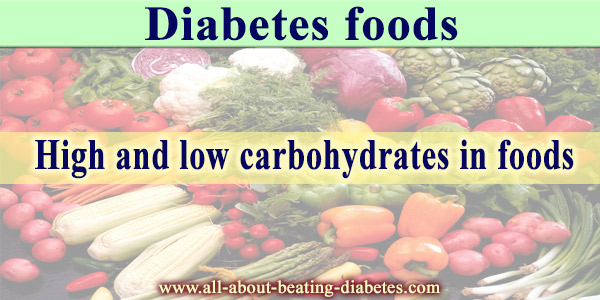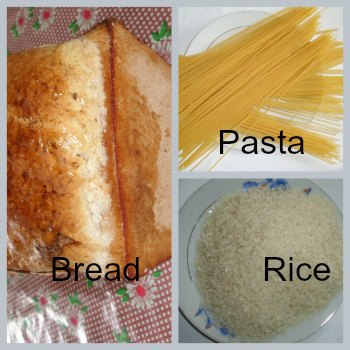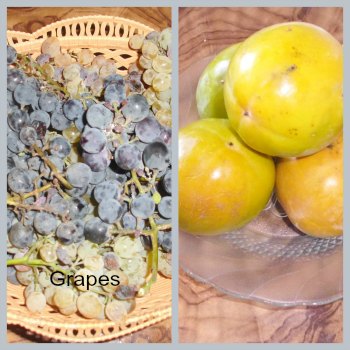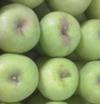Diabetes Foods: High and Low Carbohydrates in Foods
- Home
- Diabetes Foods
Diabetes management often involves monitoring carbohydrate intake to regulate blood sugar levels.
It's essential for individuals with diabetes to balance carbohydrate intake with other nutrients and maintain a healthy diet to manage their condition effectively and minimize complications.
What are good food choices for people with diabetes?
People with diabetes can benefit from making healthy food choices to help manage blood sugar levels.
Choosing the right foods for diabetes involves making mindful and balanced choices to help manage blood sugar levels.
It's important for individuals with diabetes to focus on 1) portion control, 2) monitor carbohydrate intake, and 3) maintain a well-balanced diet.
It is very important to know the amount and the content of the food you are eating whether you are a diabetic or not.
There is an folk saying: "A healthy mind stays in a healthy body". So, it’s better to prevent rather than to cure.
Following are some key principles to guide food choices for individuals with diabetes:
1. Focus on Whole Foods: Prioritize whole, unprocessed foods. These include fruits, vegetables, whole grains, lean proteins, and healthy fats. Whole foods are rich in nutrients and fiber.
2. Watch Portion Sizes: Pay attention to portion sizes to help control calorie intake and manage blood sugar levels. Use measuring tools or visual cues to estimate appropriate portions.
3. Balance Carbohydrates: Choose complex carbohydrates with a low glycemic index, such as whole grains, legumes, and non-starchy vegetables. Spread carbohydrate intake evenly throughout the day to prevent spikes in blood sugar.
4. Incorporate Lean Proteins: Include lean sources of protein, such as poultry, fish, tofu, legumes, and low-fat dairy. Protein helps maintain satiety and has a minimal impact on blood sugar levels.
5. Choose Healthy Fats: Opt for sources of healthy fats, such as avocados, nuts, seeds, and olive oil. Limit saturated and trans fats, often found in processed and fried foods.
6. Limit Added Sugars: Minimize the consumption of foods and beverages with added sugars. Check food labels for hidden sugars, and choose natural sweeteners in moderation if needed.
7. Prioritize Fiber: Include fiber-rich foods in your diet, like whole grains, fruits, vegetables, and legumes. Fiber helps stabilize blood sugar levels and promotes digestive health.
8. Moderate Fruit Intake: While fruits are a healthy choice, be mindful of portion sizes and choose fruits with lower glycemic index values. Limit fruit juices and dried fruits, which can be higher in sugar.
9. Monitor Sodium Intake: Keep an eye on sodium intake, as excessive salt can contribute to high blood pressure. Choose fresh, whole foods and limit processed and packaged items.
10. Stay Hydrated: Drink plenty of water throughout the day. Limit sugary beverages and monitor alcohol intake, as these can affect blood sugar levels.
11. Regular Meals and Snacks: Aim for regular, balanced meals and snacks to maintain consistent energy levels. Avoid skipping meals, as this can lead to overeating later.
12. Individualize Your Diet: Consider individual preferences, cultural factors, and any specific dietary needs. Work with a registered dietitian or healthcare professional to create a personalized eating plan.
13. Monitor Blood Sugar Levels: Regularly check blood sugar levels to understand how different foods impact your body. This information can help you make informed choices and adjust your diet as needed.
14. Collaborate with Healthcare Professionals: Work closely with your healthcare team, including a registered dietitian, to create a comprehensive plan tailored to your specific health needs and goals.
What foods should I avoid if I have diabetes?
Apart making smart food choice when being a diabetic, there are some foods you should avoid.
Following there is a list of foods you should generally avoid or limit:
1. Sugary Foods and Beverages: Foods high in added sugars can cause spikes in blood sugar levels. Avoid or limit consumption of sugary sodas, candies, desserts, pastries, and sweetened cereals.
2. Refined Carbohydrates: Foods made with refined grains such as white bread, white rice, and regular pasta can cause rapid increases in blood sugar levels. Choose whole grains like whole wheat bread, brown rice, and whole grain pasta instead.
3. Saturated and Trans Fats: These fats can increase your risk of heart disease and worsen insulin resistance. Limit your intake of foods high in saturated fats like fatty cuts of meat, full-fat dairy products, and fried foods. Avoid trans fats found in processed foods like packaged snacks, fried foods, and baked goods.
4. High-Sodium Foods: Processed and packaged foods, as well as restaurant meals, can be high in sodium. Too much sodium can increase your risk of high blood pressure and cardiovascular disease, which are common complications of diabetes. Opt for fresh, whole foods and use herbs and spices to flavor your meals instead of salt.
5. Fruit Juices: While fruit juices may seem healthy, they can be high in sugar and cause spikes in blood sugar levels. It's better to eat whole fruits, which contain fiber that can help stabilize blood sugar levels.
6. Sweetened Yogurts: Flavored yogurts often contain added sugars, which can contribute to blood sugar spikes. Choose plain yogurt and add your own flavorings like fresh fruit or a drizzle of honey if needed.
7. Alcohol: Drinking alcohol can lower blood sugar levels and interfere with diabetes medications. If you choose to drink, do so in moderation and always with food to help prevent low blood sugar reactions.
Can I eat fruit if I have diabetes?
Yes, you can eat fruit if you have diabetes, but it's important to choose fruits that are lower in sugar and higher in fiber to help manage blood sugar levels.
Here are some tips for incorporating fruit into your diabetes meal plan:
- Choose Whole Fruits: Whole fruits contain fiber, which can help slow the absorption of sugar into your bloodstream and prevent spikes in blood sugar levels. Opt for fresh fruits whenever possible.
- Focus on Lower-Sugar Options: Some fruits are lower in sugar than others. Examples of fruits that are lower in sugar include berries (such as strawberries, blueberries, raspberries), cherries, apples, pears, peaches, and plums.
- Watch Portion Sizes: Even though fruits are nutritious, they still contain carbohydrates that can affect your blood sugar levels. Be mindful of portion sizes and aim for moderation. A general guideline is to limit your fruit intake to about 15 grams of carbohydrates per serving, which is roughly equivalent to one small apple or 1/2 cup of berries.
- Be Careful with Fruit Juice: Fruit juice can cause rapid spikes in blood sugar levels because it lacks the fiber found in whole fruits. It's best to consume whole fruits rather than fruit juice. If you do drink juice, choose options that are 100% fruit juice and consume them in moderation.
- Consider Pairing with Protein or Fat: Pairing fruit with protein or healthy fats can help slow down the digestion of carbohydrates and minimize their impact on blood sugar levels. For example, you can enjoy apple slices with a handful of nuts or berries with Greek yogurt.
- Monitor Your Blood Sugar: Pay attention to how different fruits affect your blood sugar levels and adjust your intake accordingly. Everyone's body responds differently to carbohydrates, so it's important to find what works best for you.
Overall, fruits can be a healthy part of a diabetes-friendly diet when consumed in moderation and as part of a well-balanced meal plan.
Are artificial sweeteners safe for people with diabetes?
Artificial sweeteners can be safe for people with diabetes when consumed in moderation as part of a balanced diet. They can help satisfy sweet cravings without causing spikes in blood sugar levels.
However, it's essential to choose artificial sweeteners wisely and be aware of potential side effects.
Here are some commonly used artificial sweeteners and their safety considerations:
- Saccharin (Sweet'N Low): Saccharin has been used as a sweetener for many years and is considered safe for people with diabetes. However, some studies in animals have suggested a potential link to cancer, although this link has not been conclusively proven in humans.
- Aspartame (Equal, NutraSweet): Aspartame is widely used as a tabletop sweetener and in many diet beverages and sugar-free products. It is generally considered safe for most people, including those with diabetes. However, some individuals may be sensitive to aspartame and experience side effects such as headaches or dizziness. And truly speaking, it carries some risks for developing cancer or other serious side effects.
- Sucralose (Splenda): Sucralose is a popular artificial sweetener found in many sugar-free products. It is considered safe for people with diabetes and has no known adverse effects on blood sugar levels. However, some people may experience gastrointestinal symptoms such as gas, bloating, or diarrhea when consuming large amounts of sucralose.
- Stevia (Truvia, Pure Via): Stevia is a natural sweetener derived from the leaves of the Stevia rebaudiana plant. It is considered safe for people with diabetes and has no effect on blood sugar levels. Stevia is often preferred by those looking for a natural alternative to artificial sweeteners.
- Acesulfame potassium (Sunett, Sweet One): Acesulfame potassium is a calorie-free sweetener that is often used in combination with other artificial sweeteners to enhance sweetness. It is generally considered safe for people with diabetes, although long-term studies on its safety are limited.
While artificial sweeteners can be a useful tool for managing blood sugar levels, it's essential to use them in moderation and as part of a balanced diet.
It's also important to pay attention to how your body responds to artificial sweeteners and to choose options that work best for you.
Above all, I highly recommend my patients natural alternatives like Stevia as sugar substitute both for no effect on blood sugar and safety measures.
Are there specific snacks that are good for people with diabetes?
Yes, there are many healthy snack options that can be beneficial for people with diabetes.
When choosing snacks, it's important to focus on foods that are low in added sugars, high in fiber, and balanced with protein and healthy fats to help stabilize blood sugar levels.
Here are some snack ideas for people with diabetes:
1. Fresh Fruit: Choose lower-sugar fruits such as berries, apples, pears, and citrus fruits. Pair fruit with a source of protein or healthy fat, such as a handful of nuts or a tablespoon of nut butter, to help slow down the absorption of sugar into the bloodstream.
2. Vegetables and Hummus: Enjoy raw vegetables like carrots, cucumber slices, bell pepper strips, and cherry tomatoes with a serving of hummus for a satisfying and nutritious snack.
3. Greek Yogurt: Opt for plain Greek yogurt, which is higher in protein and lower in sugar compared to flavored varieties. Mix in some fresh berries or a sprinkle of nuts for added flavor and texture.
4. Nuts and Seeds: A small handful of nuts or seeds can be a convenient and portable snack option. Choose unsalted varieties such as almonds, walnuts, pistachios, or pumpkin seeds for a satisfying crunch and healthy fats.
5. Cottage Cheese: Cottage cheese is a good source of protein and can be paired with fruit or vegetables for a balanced snack. Try topping cottage cheese with sliced avocado, cherry tomatoes, or pineapple chunks.
6. Hard-Boiled Eggs: Hard-boiled eggs are a protein-rich snack that can help keep you feeling full and satisfied between meals. Sprinkle with a little salt and pepper or enjoy with some sliced vegetables for extra nutrients.
7. Whole Grain Crackers with Cheese: Choose whole grain crackers or crispbread and top with a slice of cheese for a satisfying snack that provides a good balance of carbohydrates, protein, and fats.
8. Edamame: Edamame (young soybeans) are a nutritious snack option that provides protein, fiber, and essential nutrients. Enjoy them steamed and lightly salted for a tasty and satisfying snack.
9. Avocado Toast: Spread mashed avocado onto whole grain toast and top with sliced tomatoes, cucumber, or a sprinkle of feta cheese for a delicious and filling snack option.
10. Popcorn: Air-popped popcorn can be a satisfying and low-calorie snack option for people with diabetes. Choose plain popcorn and avoid adding excessive butter or salt.
Remember to pay attention to portion sizes and to choose snacks that fit within your overall meal plan and dietary goals.
It's also important to monitor your blood sugar levels and adjust your snack choices as needed in consultation with your healthcare team.
Is alcohol safe for people with diabetes?
Moderate alcohol consumption can be safe for some people with diabetes, but it's essential to approach alcohol consumption with caution and moderation.
Following are some considerations for people with diabetes regarding alcohol consumption:
- Consult with Your Caring Doctor/Nurse: Before consuming alcohol, it's important to talk to your caring doctor/nurse. This is particularly important if you are taking medications that may interact with alcohol.
They can cause severe hypoglycemia and building up lactic acid leading to lactic acidosis, a serious condition. Your healthcare provider can provide personalized guidance based on your individual health status and diabetes management plan.
- Monitor Blood Sugar Levels: Alcohol can affect blood sugar levels, leading to fluctuations that may be unpredictable. It's essential to monitor your blood sugar levels closely before, during, and after consuming alcohol to understand how it affects you personally.
- Moderate Consumption: If you choose to drink alcohol, do so in moderation. Moderate alcohol consumption is generally defined as up to one drink per day for women and up to two drinks per day for men.
One drink is equivalent to 12 ounces of beer, 5 ounces of wine, or 1.5 ounces of distilled spirits. Personally, I advise my patients to consume no amount of alcohol at all.
- Be Mindful of Carbohydrates: Alcoholic beverages can contain carbohydrates, which can impact blood sugar levels.
Beer and mixed drinks often contain higher carbohydrate content, while wine and distilled spirits typically contain fewer carbohydrates. Be mindful of your carbohydrate intake from alcohol and consider how it fits into your overall meal plan.
- Avoid Sugary Mixers: Many mixed drinks and cocktails are made with sugary mixers and syrups, which can significantly increase your calorie and carbohydrate intake.
Opt for lower-sugar mixers such as club soda, diet tonic water, or lime juice, or choose light or diet versions of mixed drinks.
- Beware of Hypoglycemia: Alcohol can lower blood sugar levels, especially if consumed on an empty stomach or in combination with certain diabetes medications.
Be aware of the signs and symptoms of hypoglycemia (low blood sugar) and take precautions to prevent it, such as eating a balanced meal or snack before drinking alcohol.
- Stay Hydrated: Alcohol can cause dehydration, which may exacerbate the effects of diabetes and increase the risk of hypoglycemia. Drink plenty of water along with alcoholic beverages to stay hydrated.
- Know Your Limits: Some individuals with diabetes may need to avoid alcohol altogether due to specific health concerns or complications.
If you have any doubts or concerns about drinking alcohol with diabetes, it's best to err on the side of caution and abstain.
Overall, moderate alcohol consumption can be incorporated into a healthy lifestyle for some people with diabetes, but it's essential to be mindful of its potential effects on blood sugar levels and overall health.
Carbohydrates and diabetes
Carbohydrates are one of the three macronutrients, alongside proteins and fats, that serve as a primary source of energy for the body.
Chemically, they are organic compounds made up of carbon, hydrogen, and oxygen atoms, with a general formula of (CH2O)n.
Carbohydrates include sugars, starches, and fibers, and they are found in various foods such as fruits, vegetables, grains, and legumes.
There are three main types of carbohydrates:
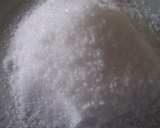
1. Simple Carbohydrates: Also known as sugars, these carbohydrates consist of one or two sugar molecules.
Examples include glucose (found in fruits and honey), fructose (found in fruits and honey), lactose (found in milk), and sucrose (table sugar).
2. Complex Carbohydrates: These are composed of long chains of sugar molecules and are often referred to as starches.
Complex carbohydrates take longer to break down in the body compared to simple carbohydrates, providing sustained energy.
Foods rich in complex carbohydrates include whole grains (such as oats, barley, and brown rice), legumes (beans and lentils), and starchy vegetables (like potatoes and corn).
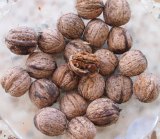
3. Dietary Fiber: Fiber is a type of carbohydrate that the body cannot digest.
It's found in plant foods and helps with digestion, regulating bowel movements, and promoting feelings of fullness.
Fiber-rich foods include fruits, vegetables, whole grains, nuts, and seeds.
Carbohydrates play a crucial role in providing energy for various bodily functions, including physical activity and brain function.
However, not all carbohydrates are created equal, and it's important to prioritize complex carbohydrates and fiber-rich foods for sustained energy and overall health.
The major part of carbohydrates comes from food you eat; the other part is produced by your body itself (during the process of gluconeogenesis).
Controlling the proper intake of foods with a special concentration on the amount of carbohydrates consumed, will help you beat your diabetes.
How can I read food labels to make better choices for my diabetes?
Reading food labels is crucial for making informed and healthier choices for managing diabetes.
By learning to read food labels and understanding how different nutrients can impact your blood sugar levels and overall health, you can make more informed choices to better manage your diabetes.
Here are some tips for reading food labels effectively:
1. Check the Serving Size: Start by looking at the serving size listed on the label. All other information on the label, including the number of calories and nutrients, is based on this serving size.
Pay attention to how many servings are in the package, as you may consume more than one serving at a time.
2. Assess Total Carbohydrates: Carbohydrates have the most significant impact on blood sugar levels, so it's important to monitor your carbohydrate intake.
Look at the total carbohydrates listed on the label, which includes sugars, fiber, and other carbohydrates.
Aim for foods that are lower in carbohydrates or choose portion sizes that fit within your carbohydrate goals for each meal or snack.
3. Evaluate Fiber Content: Fiber is beneficial for people with diabetes because it can help slow down the absorption of sugar into the bloodstream and improve blood sugar control.
Look for foods that are higher in fiber and aim to include fiber-rich foods in your diet regularly.
4. Limit Added Sugars: Pay attention to the amount of added sugars listed on the label.
Added sugars can contribute to spikes in blood sugar levels and should be limited in a diabetes-friendly diet.
Choose foods that are lower in added sugars or opt for products with no added sugars whenever possible.
5. Watch for Sodium: Monitoring sodium intake is essential for managing blood pressure and overall health, especially for people with diabetes who may be at higher risk of cardiovascular complications.
Be mindful of the sodium content listed on the label and choose lower-sodium options when available.
6. Check Fat Content: While fat itself does not directly impact blood sugar levels, it's essential to be mindful of the type and amount of fat in your diet, particularly for heart health.
Choose foods that are lower in saturated and trans fats and higher in unsaturated fats, such as those found in nuts, seeds, avocados, and fatty fish.
7. Look for Key Nutrients: In addition to carbohydrates, fiber, sugars, sodium, and fats, pay attention to other key nutrients listed on the label, such as protein, vitamins, and minerals.
Aim for foods that are nutrient-dense and provide essential nutrients to support overall health.
8. Compare Similar Products: When choosing between different brands or varieties of the same food item, compare the nutritional information on the labels to make the best choice for your dietary preferences and health goals.
|
|
|
Written by Dr.Albana Greca Sejdini, Md, MMedSc Medically reviewed by Dr.Ruden Cakoni, MD, Endocrinologist |
Last reviewed 02/20/2024 |
Related Topics:
- Are Structured Diets Helpful in Prediabetic Adolescents?
- Sugar-Sweetened Drinks Lead to Type 2 Diabetes!
Diabetes Diet and Foods Questions Problems ? Get Help Here.
This is the place where you can ask a question about any aspect of Diabetes Diet and Foods.
It's free and it's easy to do. Just fill in the form below.
What Other Visitors Have Asked
Click below to see contributions from other visitors to this page...
Glucose reaction to Scrambled Eggs/salt-cured bacon? 




QUESTION : Dear Dr. Alba,
What would be the glucose reaction if I eat 2 scrambled eggs with 2 slices of salt-cured bacon and one slice of wholegrain …
Effect of Vinegar on Type 2 Diabetes? 




QUESTION : Dr. Alba,
What is the effect of Vinegar for Type 2 Diabetics?
Rgds
ANSWER : Hi,
I want to mention some clinical findings …
Raw Sweet Potatoes & Diabetes 




QUESTION : Hi,
This not a comment but a question.
I am told that eating raw sweet potatoes is beneficial for diabetes patients.
Have you any …
Rambutan To Control Blood Sugar Level 




QUESTION : What is the rambutan compound that controls blood sugar level?
ANSWER : Hi there,
For the information of those who do not know, Rambutan …
What glycemic index Fruits to eat despite being diabetic? Not rated yet
QUESTION : I love fruits but I don't know which fruits are beneficial and which are harmful to a diabetic.
ANSWER : Hello Usha,
I read your message …
Recently Diagnosed with type II diabetes at 20 years old Not rated yet
QUESTION : Hi,
I have just recently been diagnosed with type II Diabetes and well to be frank I don't know how to start getting better naturally. …
Why Cannot Reduce Blood Sugar although Doing the Right Things? Not rated yet
Hi dear readers.
Today, I wanted to share with you the concern of Mercy Cachero regarding her mother in law, who is not able to reduce her blood …
High fiber/ high BS Not rated yet
QUESTION : Been eating much healthier but have a big problem with high fiber foods.
It's like they have the opposite effect on me.suppose to not spike …
Ideal Diabetic Diet & Natural Remedies! Not rated yet
QUESTION : Hello Dr.,
I am the regular reader of this website, gives excellent help. I am 57 years old having F.B.S. 165.9 mg/dL,Urine glucose 0.1, …
Indians Meal & Brown Rice for Diabetes Not rated yet
QUESTION : Hi,
I am an Indian and would like to know the best breakfast, lunch tea/snacks and dinner that can be served for a diabetic considering …
Some info on diabetes and stroke lifestyle and dietary regime? Not rated yet
QUESTION : Good evening,
I just want to ask if you could please let me have more info on diabetes. My husband had a stroke on Saturday. His sugar …
Is Red Wine Good to Bring Sugar Less than 160? Not rated yet
QUESTION : Dear sir,
My blood sugar is 130 to 160 after 2 hours having meal and in the morning 95 to 106.
Is red wine good to bring it down?
…
Pathophysiology of kangkong in decreasing blood sugar level Not rated yet
QUESTION : Can you provide the pathophysiology of kangkong in decreasing blood sugar level?
ANSWER : Hi there,
At first, I want to make you clear …
What foods are right to eat for a diabetic? Not rated yet
QUESTION : Eating everything what not to eat?
ANSWER : Hi Stephine,
Now I’m going to give you some basic rules on how to make your own diet with …
High blood glucose 208 after having mango juice in a non-diabetic Not rated yet
QUESTION : I had mango juice this late afternoon and checked my sugar level one hour after the meal. It was 208. I have been checking my sugar levels …
Can caffeine raise your blood glucose level? Not rated yet
QUESTION : Can caffeine raise your blood glucose level?
ANSWER : Hi there,
This is a very important question, because a lot of people are consuming …
I'm a diabetic, does wine raise or lower my blood sugar level? Not rated yet
QUESTION : I'm a diabetic, does wine raise or lower my blood sugar level?
ANSWER : Hi there,
That is a very good question and every diabetic or …
TYPE II DIABETIC CAN HAVE APPLE Not rated yet
QUESTION : TYPE II DIABETIC CAN HAVE APPLE? DOES IT INCREASE SUGAR LEVEL?
ANSWER : Hi Nesh,
Yes, definitively one diabetic can have apple …
How to control/manage my PP Blood sugar levels? Not rated yet
QUESTION : I am 55, 5.10/74 KG, associate professor. I have been suffering from Diabetes ( ev.one in the family) for the past 10 years.
Of late despite …
The Mediterranean Diet Meal Plan - Successful On Metabolic Syndrome Not rated yet
Hi dear readers,
As you may probably know, my favorite diet that I love to follow is the Mediterranean diet. What I found today in my e-mail box was …
Diabetes And Alcoholism Not rated yet
How does alcoholic drinks affect diabetes?
Should Diabetics Drink Alcohol?
Answer By Dr Alba
There are several studies indicating that …
Natural solutions to lower my high numbers of blood sugar Not rated yet
I want to lower my high numbers of blood sugar with diet and not drugs.
They were 7.3 at my last appointment.
Beat diabetes with diet …
Splenda Glycemic Index And Relation With Insulin? Not rated yet
QUESTION : Is it true that splenda glycemic index is high? Does it really cause blood glucose to reach the peak quickly?
What about the effects on …
Type 1 Diabetes and Alcohol Drinking Not rated yet
QUESTION : I have a girlfriend, shes diabetic type 1, juvenile she had it since she was 11, she's now 23.
I read parts of this site, but my question …
Foods for pre diabetes Not rated yet
QUESTION : I've heard the statistics on pre-diabetes, and got some questions. Does it really work if someone take care of foods and exercise and will …
Diabetes food restrictions Not rated yet
My cousin is diagnosed with diabetes type 2, and the doctor has put on some food restrictions, but this is very hard for her.
She has been used to …
Low carb Diabetes type 2 diet concern. Not rated yet
I'm recently diagnosed with type 2 diabetes, and am on low carb diet and have good control my blood sugar levels. I've read alot about it and got confused …
Diabetes complications Questions or Problems? Get Help Here
This is the place where you can ask a question about any aspect of diabetes complications.
It's free and it's easy to do. Just fill in the form below, then click on "Submit Your Question".
